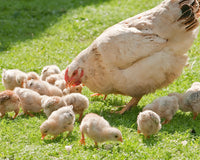It’s disappointing when you check your garden and there’s damage to your plants. Instead of using harsh chemicals to combat the problem, you can use a sustainable and natural approach! Beneficial insects make up 90% of the insects found in your garden. These include pollinators, predators, and parasites. They help solve your pest problems without creating damage. It’s important to know which insects are beneficial to your garden.

#1. Ladybugs
One of the most well-known beneficial insects are ladybugs. They’re popular for a reason: ladybugs can eat up to 50 aphids within an hour! When they lay eggs, the larvae feast on the aphids and continue during their adult size. Their red-and-black, tiny bodies don’t go unnoticed and provide excellent work.

#2. Praying Mantis
This sneaky insect is ruthless when it comes to its job. The praying mantis patiently stalks its prey, using its arms to ambush. They can camouflage, coming in shades of green or brown. Despite eating pests, they’re known to go after beneficial insects, such as bees, butterflies, and praying mantises!

#3. Hoverflies
Similar in appearance to honeybees, these flies are versatile in each life stage. At their adult size, they’re excellent pollinators and use nectar as an energy source. They plant their eggs underneath the leaves near aphids. At their larval size, their primary food source is aphids.

#4. Jumping Spiders
Although spiders have a bad reputation, these tiny spiders are the opposite! Jumping spiders use a shift in blood flow to pounce on their targets, such as mosquitoes and stinkbugs. Since they actively look for prey, they don’t use webs. Be assured they’re not interested in human interaction or moving indoors.

#5. Parasitic Wasps
These wasps don’t have a stinger, but they brutally attack their prey. When they hatch their eggs, they hatch near the pests’ eggs and take over the host insect. The larvae’s goal is to prevent the pests’ eggs from hatching. Like hoverflies, parasitic wasps feast on nectar for energy, while the larvae feast on eggs.
Beneficial insects thrive on gardens that accommodate their needs. By planting native plants, nectar plants, and using sustainable products, you allow beneficial insects to do the work for you. Do not lump these insects with the bad guys, beneficial insects are on your side!






